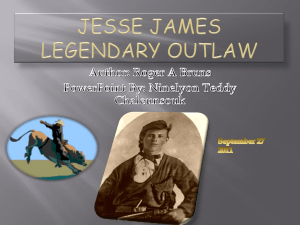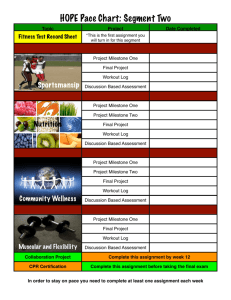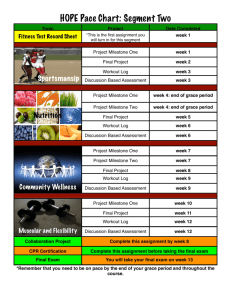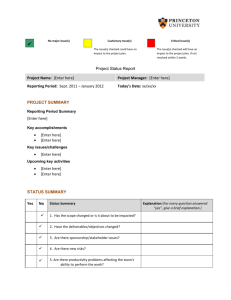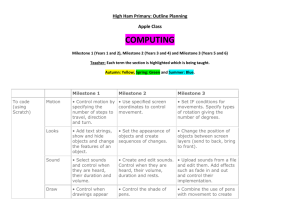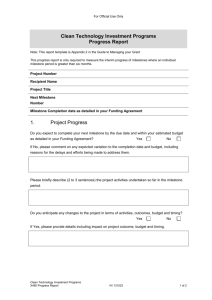High Ham Primary: Outline Planning
advertisement
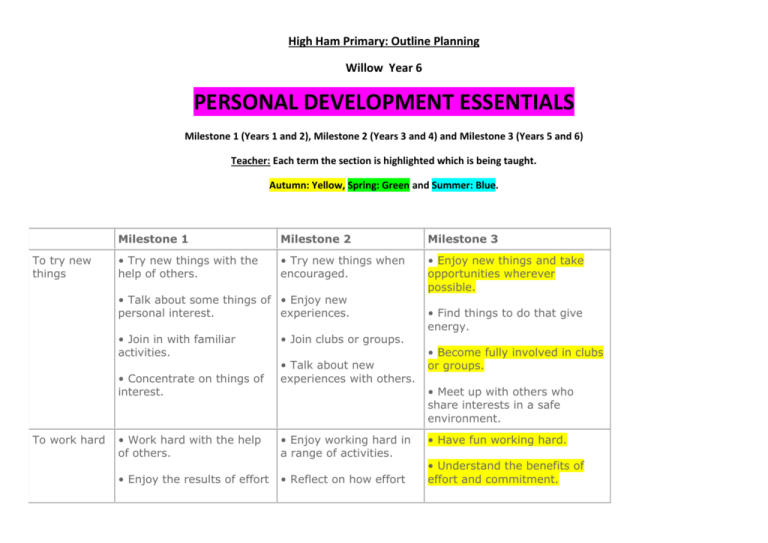
High Ham Primary: Outline Planning Willow Year 6 PERSONAL DEVELOPMENT ESSENTIALS Milestone 1 (Years 1 and 2), Milestone 2 (Years 3 and 4) and Milestone 3 (Years 5 and 6) Teacher: Each term the section is highlighted which is being taught. Autumn: Yellow, Spring: Green and Summer: Blue. To try new things Milestone 1 Milestone 2 Milestone 3 • Try new things with the help of others. • Try new things when encouraged. • Enjoy new things and take opportunities wherever possible. • Talk about some things of • Enjoy new personal interest. experiences. • Join in with familiar activities. • Concentrate on things of interest. To work hard • Join clubs or groups. • Talk about new experiences with others. • Find things to do that give energy. • Become fully involved in clubs or groups. • Meet up with others who share interests in a safe environment. • Work hard with the help of others. • Enjoy working hard in a range of activities. • Enjoy the results of effort • Reflect on how effort • Have fun working hard. • Understand the benefits of effort and commitment. To concentrate in areas of interest. leads to success. • Take encouragement from others in areas of interest. • Begin to encourage others to work hard. • Give attention to areas of interest. • Focus on activities. • Give full concentration. • ‘Tune out’ some distractions. • ‘Tune out’ most distractions. • Begin to ‘tune out’ distractions. • Begin to show signs of concentration. • Begin to seek help when needed. To push themselves • Search for methods to help with concentration. • Develop areas of deep interest. • Express doubts and fears. • Begin to understand why some activities feel • Explain feelings in uncomfortable. uncomfortable situations. • Show a willingness to • Begin to push past fears overcome fears. (with encouragement). • Push past fears and • Listen to people who try reflect upon the to help. emotions felt afterwards. • Begin to try to do • Begin to take something more than once. encouragement and advice from others. • Continue to practise even when accomplished. • Encourage others by pointing out how their efforts gain results. • Understand techniques and methods that aid concentration. • Develop expertise and deep interest in some things. • Find ways to push past doubts, fears, or a drop in motivation even in challenging circumstances. • Push oneself in areas that are not so enjoyable. • Listen to others who encourage and help, thanking them for their advice. • Reflect upon how pushing past doubts, fears or a drop in motivation leads to a different • Keep trying after a first outlook. attempt. To imagine • With help, develop ideas. • Respond to the ideas of others’. • Respond to questions about ideas. • Act on some ideas. To improve To not give • Generate lots of ideas. • Show a willingness to be wrong. • Show some enthusiasm for the ideas • Know which ideas are useful of others. and have value. • Ask some questions in • Act on ideas. order to develop ideas. • Show enjoyment in trying out some ideas. • Ask lots of questions. • Share with others a number of positive features of own efforts. • Clearly identify own strengths. • Make a small improvement (with help). • Identify areas for • Identify a few areas for improvement. improvement. • Seek the opinion of others to • Attempt to make help identify improvements. improvements. • Show effort and commitment in refining and adjusting work. • Show an awareness of someone who is talking. • Listen to others, showing attention. • Listen first to others before trying to be understood. • Show an understanding that ones own behaviour affects other people. • Think of the effect of behaviour on others before acting. • Change behaviours to suit different situations. • Listen to other people’s point of view. • Describe the points of view of others. • Share with others likes about own efforts. • Choose one thing to improve (with help). To understand others • Begin to enjoy having new ideas. • Describe and understand others’ points of view. • Try again with the help of • Find alternative ways if • Show a determination to keep up others. • Try to carry on even if a failure causes upset. the first attempt does not work. • Bounce back after a disappointment or • Keep going in activities of failure. interest. • Show the ability to • Try to think of oneself as stick at an activity (or a lucky. club or interest). • See oneself as lucky. going, despite failures or set backs. • Reflect upon the reasons for failures and find ways to bounce back. • Stick at an activity even in the most challenging of circumstances. • See possibilities and opportunities even after a disappointment. • Consider oneself to be lucky and understand the need to look for luck.

